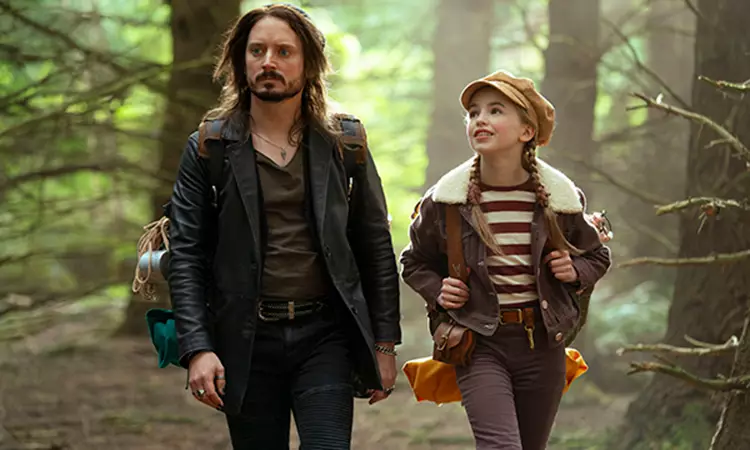Ant Timpson’s latest film, “Bookworm,” which premiered at Fantasia 2024 on July 18, takes viewers on a whimsical yet profound journey that grapples with themes of parenthood, adventure, and the intersection of theory and reality. The film’s opening scene efficiently sets the stage with the lead character, 11-year-old Mildred, played by Nell Fisher, sharing her identity as a “card-carrying bookworm.” This declaration not only reflects her profound love of literature but also paints her as somewhat of a naïve scholar, one whose vast knowledge of words might be overshadowed by her practical understanding of the world around her. In essence, the film quickly establishes its dual narrative—Mildred’s earnest quest for knowledge and the contrasting real-world experiences she is about to encounter.
The central plot revolves around her aspiration to document the enigmatic Canterbury panther during a camping trip she has convinced her overworked mother, Zo (Morgana O’Reilly), to undertake. However, a sudden twist of fate leaves Zo incapacitated, leading to the introduction of Strawn Wise (Elijah Wood), Mildred’s estranged father. It is this unlikely pairing of an inexperienced father and his book-smart daughter that forms the backbone of the narrative. Their adventure serves as a vehicle not just for Mildred’s quest but also for Strawn’s journey of self-discovery and familial reconciliation.
Contrast in Character Dynamics
Delving deeper into the characters, it’s fascinating to observe the contrast between Mildred and Strawn. Mildred embodies youthful optimism, a stark contrast to Strawn’s almost comical ineptitude as a father. While Mildred’s approach to life is analytical and laden with bookish insights, Strawn, portrayed as a washed-up illusionist, represents the Everyman who is struggling to find his place in an unforgiving world. Their initial interactions are fraught with misunderstandings and the awkwardness of their newfound relationship, setting the stage for growth.
As the duo explores the wilderness, there is a notable shift in their dynamic. The constrained, almost suffocating perspective of Mildred’s life transforms into one of freedom and discovery in the great outdoors. This transition is artistically represented through the film’s cinematography, moving from a constricted Academy ratio to a broader widescreen format, evoking a sense of expanding possibilities as the characters forge ahead.
Timpson’s film is intentionally layered, echoing his previous work, “Come to Daddy,” which also explored themes of estrangement and fragmented relationships. However, “Bookworm” stands apart as a family-oriented narrative where the focus shifts from toxic masculinity to the redemptive qualities of fatherhood. The film juxtaposes the characters’ comedic misadventures against the backdrop of their quest, illustrating that even the most broken relationships can carry the potential for healing in the face of adversity.
Balancing Humor and Heart
Timpson balances elements of humor and heart, evoking comparisons to other modern family films, such as Taika Waititi’s “Hunt for the Wilderpeople.” Similarities abound, particularly in terms of the adventurous spirit that defines the narratives. Both feature young protagonists embarking on exploratory journeys fueled by curiosity, underscored by the longing for paternal connection.
Yet, while “Hunt for the Wilderpeople” introduces a darker comedic vein, “Bookworm” leans toward a more wholesome sentiment. The film steers audiences towards an uplifting conclusion, reinforcing the idea that no matter the obstacles faced, genuine relationships can foster growth and understanding. The father-daughter duo of Strawn and Mildred, brought vibrantly to life by Wood and Fisher, exhibits a delightful on-screen chemistry that charms viewers.
The character development is essential as both Strawn and Mildred come to appreciate their shared traits and idiosyncrasies. This journey of discovery culminates in a heartfelt reunion, solidifying Mildred’s newfound understanding of her father and the steps he takes to become a better parent.
“Bookworm” emerges as a gentle yet engaging film that navigates complex familial themes through the lens of innocence and adventure. Its success lies in its ability to blend humor with emotional depth, encapsulated by the evolving dynamics of its central characters. With vibrant performances, particularly from Wood and Fisher, and Timpson’s adept direction, this cinematic experience resonates with audiences of all ages. It reminds us that while knowledge is critical, experiences and relationships are the true essence of personal growth. Through Mildred’s expedition and Strawn’s transformation, viewers are left pondering not only the mysteries of life but also the treasures found in the bonds of family.


Leave a Reply